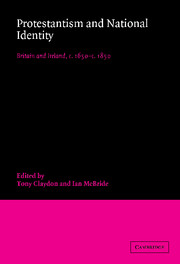1 - The trials of the chosen peoples: recent interpretations of protestantism and national identity in Britain and Ireland
Published online by Cambridge University Press: 16 October 2009
Summary
On 29 January 1689, the constitutional convention which had as-sembled in London to discuss the state of the nation after the flight of James II reached a moment of extraordinary consensus. A body which was deeply split between whigs and tories, which contained both future Jacobites and future ministers of William III, and which would continue to argue for two more weeks before deciding what to do about the disappearance of the monarch, unanimously agreed a resolution proposed by Colonel John Birch in its lower house and sent up to the assembled peers as soon as it had been approved. The resolution stated that ‘it hath been found by experience, to be inconsistent with the safety and welfare of this Protestant Kingdom to be governed by a Popish Prince’. The convention thus united its very disparate members in an unequivocal, and perhaps the first official, recognition of the essential protestantism of its nation. Through the wording of the resolution, people of every political persuasion had accepted that their realm was something so closely bound to the reformed faith that neither its interests, nor its constitution, nor its very identity, could be conceived without reference to that religion.
Throughout the period considered by this volume, this sense of the fundamental protestantism of Britain and Ireland was to have far-reaching consequences.
- Type
- Chapter
- Information
- Protestantism and National IdentityBritain and Ireland, c.1650–c.1850, pp. 3 - 30Publisher: Cambridge University PressPrint publication year: 1998
- 6
- Cited by



